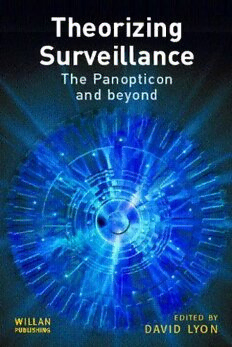
Theorizing surveillance: the panopticon and beyond PDF
352 Pages·2006·2.031 MB·English
Most books are stored in the elastic cloud where traffic is expensive. For this reason, we have a limit on daily download.
Preview Theorizing surveillance: the panopticon and beyond
Description:
This book is about explaining surveillance processes and practices in contemporary society. Surveillance studies is a relatively new multi-disciplinary enterprise that aims to understand who watches who, how the watched participate in and sometimes question their surveillance, why surveillance occurs, and with what effects. This book brings together some of the world's leading surveillance scholars to discuss the "why" question. The field has been dominated, since the groundbreaking work of Michel Foucault, by the idea of the panopticon and this book explores why this metaphor has been central. Read more... Front cover; Copyright; Contents; Acknowledgements; Notes on the contributors; Part 1: Introduction; 1. The search for surveillance theories (David Lyon); Part 2: Post-Panoptic Surveillance Theory; 2. Tear down the walls: on demolishing the panopticon (Kevin D. Haggerty); 3. Security, exception, ban and surveillance (Didier Bigo); 4. Looking into the future: surveillance, globalization and the totalitarian potential (Maria Los); Part 3: Space and Time in Surveillance Theory; 5. Surveillance assemblages and lines of flight (William Bogard). 6. Tense theory: the temporalities of surveillance (Gary Genosko and Scott Thompson)7. Pre-empting panoptoc surveillance: surviving the inevitable war on terror (Greg Elmer and Andy Opel); Part 4: Subjects and Contexts of Surveillance; 8. 'The other side of surveillance': webcams, power and agency (Hille Koskela); 9. Telemonitoring of cardiac patients: user-centred research as input for surveillance theories; 10. The role of confession in reflective practice: monit
See more
The list of books you might like
Most books are stored in the elastic cloud where traffic is expensive. For this reason, we have a limit on daily download.
